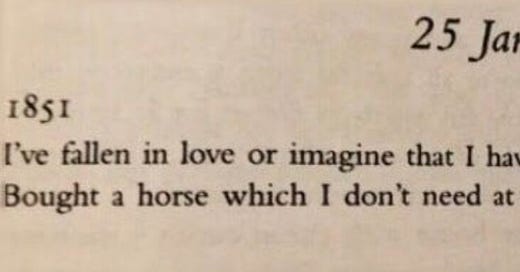My last serious relationship came to an end almost six years ago, and while I have had little dalliances in that time, I have remained determinedly single, or indeed #BoySober ever since. This term, originally coined by comedian Hope Woodward earlier this year heralded a thousand articles about what dating really looks like in 2024 and it seems many of us are existing similarly – disinclined to back a very lame, very tried and tested horse. Only weeks later it was announced that South Korea’s birth rate was so low their population is estimated to halve by the year 2100, spearheaded by women choosing ‘child-free lives’. This all made a lot of sense to me – any ideas I used to have about marriage or starting a family were no longer things that I really thought of, speak less of desired – I had settled in to being single very quickly, and very comfortably and took solace in the idea that I wasn’t alone in err, being alone.
My friends and family however had been getting married and having babies at an alarming rate – and while some of them absolutely do *prefer* this version of life, at least 80% (official stats based on ill-gotten-gossip) of them seem to be making huge sacrifices to make it work, and like the women of South Korea and my #BoySober brigade I had oft thought these odds weren’t worth the gamble, but perhaps making sacrifices for the ones we love is… OK?
Is it any wonder I took to being alone so easily? Sex and the City hit our screens the year my parents divorced, at the time divorce rates were as high as they had ever been – the perfect breeding ground for generation defining scenes like Charlotte’s cutesy “Maybe we could be each other's soul mates. And then we could let men be just these great nice guys to have fun with” to become the rallying cry for girls everywhere (at least all the ones I knew).
Nearly two decades after SATC hit our screens my ex and I parted ways; our irreconcilable differences could be shortened to ‘he really liked shagging sex workers and I would have really preferred the money to be spent on rent’. That same year Dolly Alderton’s Everything I Know About Love was published – a refresher of Charlotte York’s suggestion that women could be each other soulmates but from someone who was close to my age, and thanks to the indelicate nature of parasocial relationships and a hugely popular podcast, already felt like a pal. It reminded me that my best friends could be and already were the loves of my life and for a time this was the most glorious gift I could have asked for while navigating such a debilitating breakup.
I was early 30’s then, and for the following six years I remained dedicated to being the perfect partner to my friends – my first step was to tier them, this was to help me understand what was expected of me and in turn what I could expect from them. I was relentless in my pursuit for friendships that were so nourishing they stood out, not just amongst other friendships, but amongst relationships. I was better than your boyfriend could ever be, and in turn you would fill the gaps left by my ex without any of the bad stuff.
I was smug. I would listen to my friends who were dating actively and feel so confident in my decision, I got all the good, absolutely none of the bad. What a gift my friendships were and continue to be, but as I approach year 7 like with all relationships there are bumps in the road.
One of my best friends started seeing someone who was connected to a friend couple of mine – and suddenly I was flashing forward to the inevitable exclusion in their double dates, utterly bereft I cried for days and after some reflection realised that I needed to chill out and maybe not put all the pressure I’d taken out of romantic relationships on to her really lovely shoulders.
Other friendships I was investing in showed themselves to have a much lower ROI than I had initially assumed, and not until I read that sentence a few times did I realise how mad it is to have such expectations of people, of friends – but the kicker is we do and are allowed to have those expectations with regards to romantic relationships, which is why I wonder if platonic friendships can ever really live up to their romantic counterparts.
It's like I took all my most fragile romantic eggs and threw them at my friends and then blamed them when they broke.
What became clear is that people partner up for a myriad of deliciously enchanting reasons, and sure some, even potentially most relationships are harder work than I have long believed was acceptable – but I am starting to think that it's only in romantic relationships that we fully ‘give ourselves’ while being able to expect the same in return, and because of that I might wander carelessly back in to oncoming traffic dating.





Just re read this and you really are such a writer! ✍️🩷